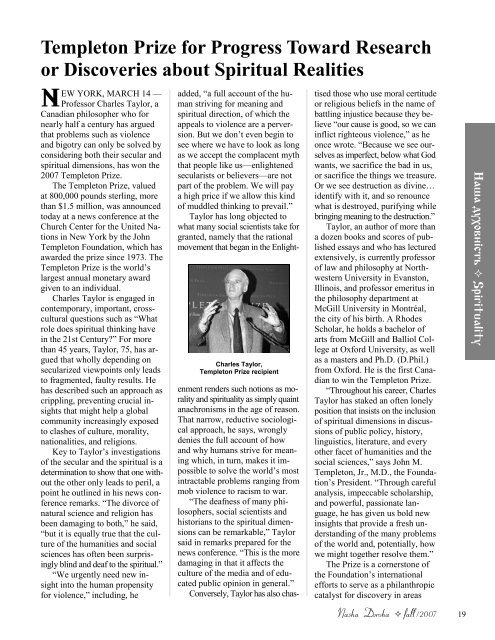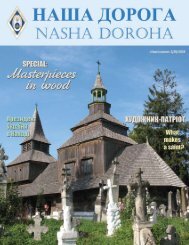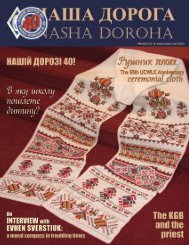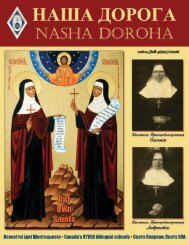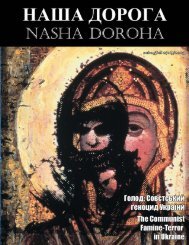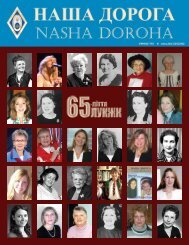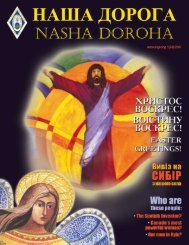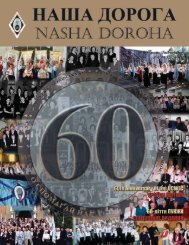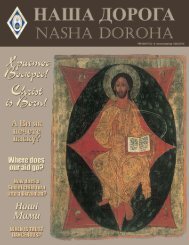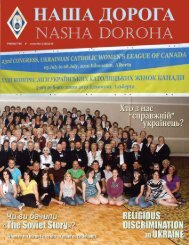2007 3(26) - UCWLC
2007 3(26) - UCWLC
2007 3(26) - UCWLC
- No tags were found...
Create successful ePaper yourself
Turn your PDF publications into a flip-book with our unique Google optimized e-Paper software.
Templeton Prize for Progress Toward Researchor Discoveries about Spiritual RealitiesEW YORK, MARCH 14 —N Professor Charles Taylor, aCanadian philosopher who fornearly half a century has arguedthat problems such as violenceand bigotry can only be solved byconsidering both their secular andspiritual dimensions, has won the<strong>2007</strong> Templeton Prize.The Templeton Prize, valuedat 800,000 pounds sterling, morethan $1.5 million, was announcedtoday at a news conference at theChurch Center for the United Nationsin New York by the JohnTempleton Foundation, which hasawarded the prize since 1973. TheTempleton Prize is the world’slargest annual monetary awardgiven to an individual.Charles Taylor is engaged incontemporary, important, crossculturalquestions such as “Whatrole does spiritual thinking havein the 21st Century?” For morethan 45 years, Taylor, 75, has arguedthat wholly depending onsecularized viewpoints only leadsto fragmented, faulty results. Hehas described such an approach ascrippling, preventing crucial insightsthat might help a globalcommunity increasingly exposedto clashes of culture, morality,nationalities, and religions.Key to Taylor’s investigationsof the secular and the spiritual is adetermination to show that one withoutthe other only leads to peril, apoint he outlined in his news conferenceremarks. “The divorce ofnatural science and religion hasbeen damaging to both,” he said,“but it is equally true that the cultureof the humanities and socialsciences has often been surprisinglyblind and deaf to the spiritual.”“We urgently need new insightinto the human propensityfor violence,” including, heCharles Taylor,Templeton Prize recipientadded, “a full account of the humanstriving for meaning andspiritual direction, of which theappeals to violence are a perversion.But we don’t even begin tosee where we have to look as longas we accept the complacent myththat people like us—enlightenedsecularists or believers—are notpart of the problem. We will paya high price if we allow this kindof muddled thinking to prevail.”Taylor has long objected towhat many social scientists take forgranted, namely that the rationalmovement that began in the Enlightenmentrenders such notions as moralityand spirituality as simply quaintanachronisms in the age of reason.That narrow, reductive sociologicalapproach, he says, wronglydenies the full account of howand why humans strive for meaningwhich, in turn, makes it impossibleto solve the world’s mostintractable problems ranging frommob violence to racism to war.“The deafness of many philosophers,social scientists andhistorians to the spiritual dimensionscan be remarkable,” Taylorsaid in remarks prepared for thenews conference. “This is the moredamaging in that it affects theculture of the media and of educatedpublic opinion in general.”Conversely, Taylor has also chas-tised those who use moral certitudeor religious beliefs in the name ofbattling injustice because they believe“our cause is good, so we caninflict righteous violence,” as heonce wrote. “Because we see ourselvesas imperfect, below what Godwants, we sacrifice the bad in us,or sacrifice the things we treasure.Or we see destruction as divine…identify with it, and so renouncewhat is destroyed, purifying whilebringing meaning to the destruction.”Taylor, an author of more thana dozen books and scores of publishedessays and who has lecturedextensively, is currently professorof law and philosophy at NorthwesternUniversity in Evanston,Illinois, and professor emeritus inthe philosophy department atMcGill University in Montréal,the city of his birth. A RhodesScholar, he holds a bachelor ofarts from McGill and Balliol Collegeat Oxford University, as wellas a masters and Ph.D. (D.Phil.)from Oxford. He is the first Canadianto win the Templeton Prize.“Throughout his career, CharlesTaylor has staked an often lonelyposition that insists on the inclusionof spiritual dimensions in discussionsof public policy, history,linguistics, literature, and everyother facet of humanities and thesocial sciences,” says John M.Templeton, Jr., M.D., the Foundation’sPresident. “Through carefulanalysis, impeccable scholarship,and powerful, passionate language,he has given us bold newinsights that provide a fresh understandingof the many problemsof the world and, potentially, howwe might together resolve them.”The Prize is a cornerstone ofthe Foundation’s internationalefforts to serve as a philanthropiccatalyst for discovery in areasÍàøà äóõîâíiñòü SpiritualityNasha Doroha fall/<strong>2007</strong> 19


